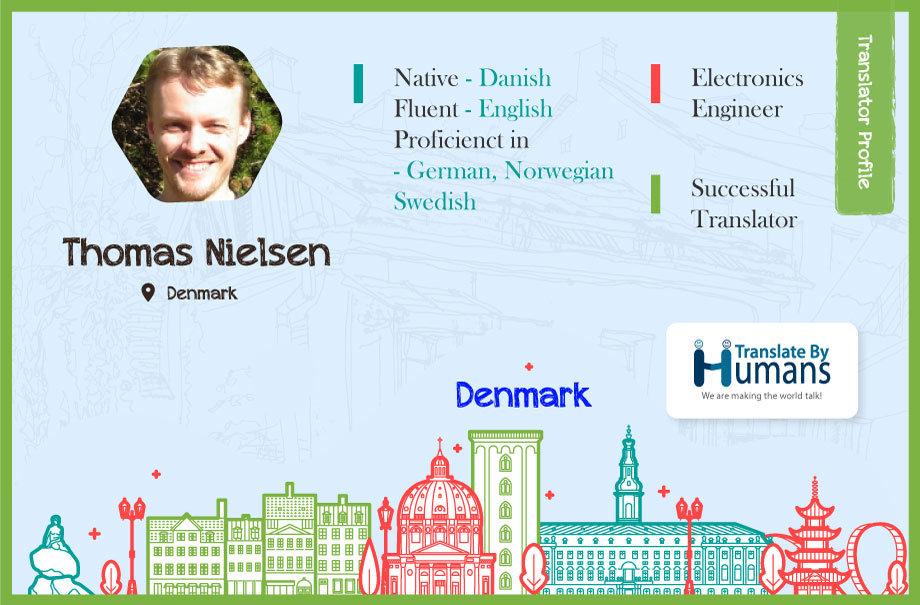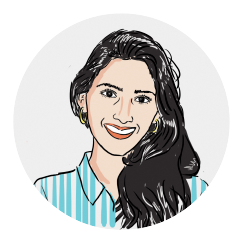Our monthly translator interview series continues! Today we have with us, Thomas Nielsen from Denmark who specialises in Danish translation and is a master of many others. Here’s the first part of the interview where Thomas talks about himself, his family and journey from being an electronics engineer to becoming a full-time translator.

1: We are happy to have you here with us today. Could you start by telling us about your country and its culture?

Thomas:
I live in Denmark which is my native country. Denmark is a small country with a lot of farmland and long white beaches. We compete well in technology exports and have a high focus on renewable energy. One of the renowned Danish companies in this field is Vestas which exports wind turbines. Denmark is a very orderly country with a clean environment. I think most people here prefer the security and there are rules for nearly everything. Somehow though, it’s doesn’t limit the innovation and entrepreneurship as those parts of the culture are thriving.
2: We’d love to know a little more about your family and lifestyle.
Thomas:
I come from a family of entrepreneurs who didn’t take the traditional employment path. My dad and my granddad worked with electronics and my mother and my stepdad worked with textiles. Those businesses are closed now but it was a great period of my life. For me, there were always great opportunities to apply electronics in order to solve problems and optimise which sparked a lifelong interest for me in electronics, computers, programming, production, and business.
TBH
That’s an interesting start! What are some of your long-term goals?
Thomas:
I would like to use all of my knowledge and skills to be able to translate entire books and get that sense of accomplishment from participating in the publication of a large piece of work.
3: Please tell us about your educational background and experience.

Thomas:
I completed my education as an electronics engineer which was mostly inspired by my dad and granddad who worked with electronics. They worked as technicians with some of the best TV and radio brands like the Danish B&O brand. My textbooks as an engineer were almost all written in English through which I got exposure to many technical terms. After more than a decade of working as an electronics engineer, I realized that I really liked the communication aspect of it, mostly through manuals and datasheets. Along the way, I have still been very much involved with IT and computers so that is also something I work with a lot.
4:How and why did you become a translator?
Thomas:
When I started using computers back in the 80s, everything was in English so it was necessary to figure out what all those words meant – and also to impress myself and my friends! This knowledge of technical terms became very useful when my stepdad imported machines from Japan and the limited amount of documentation was in English. I would help by configuring the machines so that they would do what we wanted them to do for textile production.
5:How has being multilingual helped you?

Thomas:
Having an intimate relationship with another language than my native language has been very satisfying for me because I can help get the meaning across the language barrier.
6:Is there one language you prefer thinking in over another language?
Thomas:
Most of the time my thoughts are in my native language, Danish but I often also think in English and take notes in English if I think the words are more precise. I remember taking a trip to Germany years ago by myself, and after a few days, I noticed that my thoughts were switching to German which was quite a surprise because I don’t even work in the German to Danish language pair.
7:Teach us some new phrases in your language
Thomas:
“Vi kæmper og trykker på pyt-knappen, hvis der sker en fejl.”
“We’ll fight through it and press the oh well button if things go wrong.”
TBH
What a wonderful attitude to have!
8:What does a normal day in your life look like?

Thomas:
I work from home so I have lots of opportunities to feed my brain and really take control of what I feed it with. So before I even open my email inbox I look for new ideas to improve all aspects of my translation business. In that positive state, I am then ready to reply to everyone and put new bookings on my calendar. I also do marketing and sales and perhaps a bit of accounting, and then I’m off to the production of translations. In my lunch break, I feed my brain with even more new ideas in the world of translation and tools. After that, it’s back to translation again.
9:What would you have done differently at the start of your career if you knew then, what you know now?

Thomas:
When I worked as an engineer it was always pretty clear what kind of product we would be developing next. It was up to the product managers to know why, what and when, and we as engineers would figure out how to make it happen. As a translator, I know how to translate but it gets lonely pretty quickly if I don’t find someone who knows why, what and when.
TBH
How do you feel entrepreneurs like yourself can achieve that?
Thomas:
As an employee, you can survive by focusing on your skills but because I started out with my own company, that wasn’t enough. I think it’s better to start out by finding potential customers instead of focusing on what you do. In business, you have to value marketing and sales just as much as producing your product or service.
In the next part of the interview, we’ll discuss business, entrepreneurship and the essentials of being a great translator!

